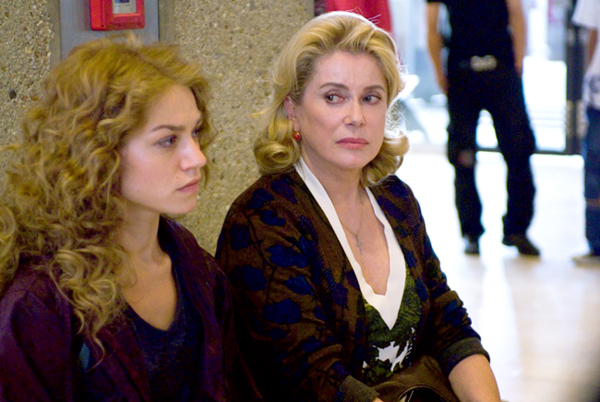|
Reviews of Recent Independent, Foreign, & Documentary Films in Theaters and DVD/Home Video

THE GIRL ON THE TRAIN
The film is based on the true story of a so-called hate crime, which took place in Paris six years ago. On July 19, 2004, a young woman reported herself the victim of an anti-Semitic attack on a commuter train. The media fury surrounding the initial incident, and the subsequent chain of events, brought to head latent French prejudices and raised criticisms about French society and media. But almost immediately, her own mother senses that all is not accurate about her statement to the police. To his credit, director André Téchiné tells the story with very little inflammatory drama and fuss. He barely glances at the media blitz surrounding Jeanne, except for brief references. Téchiné separates the story into two parts, one named “Circumstances,” the other “Consequences,” with the dividing line being events before and after the incident. The 18-year-old girl, named simply here Jeanne (Émilie Dequenne), is luminous, beautiful, and aimless. Much of her time she spends ecstatically rollerblading through the streets of Paris, instead of searching for the secretarial work her mother keeps urging on her. While rollerblading, Jeanne meets Franck (Nicolas Duvauchelle), an intense young wrestler who falls for her almost immediately. It is clear Jeanne is wistful for attention, to be first—having been raised by a single mother whose job it is to take care of other people’s children, and having grown up without a father. Despite initially rebuffing Franck, she quickly acquiesces to his desires, progressing from Web cam flirtation to living with him in a matter of weeks. Their intense affair ends with abrupt violence, and soon after, Jeanne reports her story to the police. The cast is as understated as the narrative. Catherine Deneuve gives an excellent, subdued performance as Jeanne’s worried mother, Louise. Equal parts suave and sentimentality, Michel Blanc plays Samuel Bleistein, a high-profile Jewish attorney whose old ties to Louise involve him in Jeanne’s case. The somewhat extraneous side plot involving the Bleistein family rounds out the cast: Samuel’s estranged son, Alex (Mathieu Demy); Alex’s ex-wife, Judith (Ronit Elkabetz); and their young son, Nathan (Jeremy Quaegebeur). It is clear Téchiné intends to use the Bleistein family portrait to counterpoint Jeanne’s actions. She lies, true, but so do others, although in less destructive ways. Everyone deceives in their desire be loved. The passion between Judith and Alex is only equaled by their mutual misunderstanding, and Bleistein shields himself into complacency to avoid the hurt of old flame Louise’s rejection. Only teenager Nathan speaks the truth, to the point of bluntness. Occasionally, the Bleistein story line distracts from Jeanne, the ultimate draw in the film. Though the contrast between her and the Bleisteins is effective, the back-and-forth can become tiring. The annoyance, however, is minor. For the most part, Téchiné avoids using his characters as social mouthpieces. His camera follows Jeanne closely, but never too intimately. Téchiné eschews intense close-ups and chooses to let the camera observe and record, but rarely comment, while Jeanne rollerblades from station to station, street to street, or riding the train from the suburbs to Paris. Jeanne’s psychological state is opaque. We never are allowed too far in, and, helped by Émilie Dequenne’s enigmatic performance, we are never quite able to pin her down. The Girl
on the Train
offers no clear-cut explanations, only facts. However, based on the
first hour’s insightful set-up, we have enough hints or pieces of evident
to why Jeanne perpetrates what will be a perplexing action. Though her
thoughts may be obscure, her motivations aren’t entirely impenetrable.
Perhaps as her boyfriend states at one point, she is merely “a girl
who lies.” There is more to it, but for Téchiné, we can only know what
Jeanne does, and we may only surmise the why. Like Mark Twain, we feel we
can never truly know another person’s mind, and in that, the real story
is always lost.
Lisa Bernier
|

